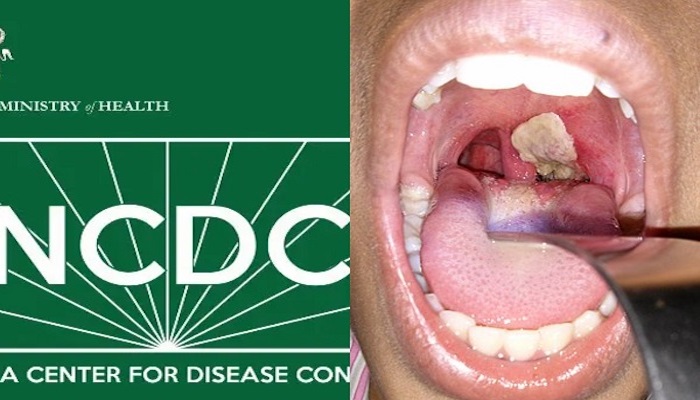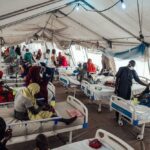Nigeria’s Struggle to Contain Severe Diphtheria Outbreak

Northern Nigeria grapples with a harrowing diphtheria outbreak, the most devastating in the nation’s history, as hundreds of lives succumb to this perilous disease since the year began. Among the afflicted, a 10-year-old girl lies in critical condition, encapsulated within a glass cubicle, battling the relentless contagion.
Usman Hassan, a medic in charge at Kano’s largest hospital, expresses the dire need for intensive care for the afflicted girl. Diphtheria, the merciless infectious disease, has overwhelmed communities and healthcare facilities.
The outbreak, which has claimed the lives of around 800 people and infected over 14,000, has infiltrated nearly half of Nigeria’s 36 states, with Kano shouldering the heaviest burden in terms of cases and fatalities.
Kano’s Murtala Muhammad Specialist Hospital houses one of two health facilities managed by Médecins Sans Frontières (MSF), the French medical charity that has spearheaded the response to this dire epidemic.
As of Thursday, Kano reported a staggering 10,700 diphtheria cases, with over 500 fatalities, according to Hashim Juma Omar, a doctor overseeing MSF’s diphtheria intervention.
Access to the hospital’s 90-bed clinic is meticulously controlled to stave off further infection. “We are currently seeing more than 700 people with suspected diphtheria and admitting more than 280 patients weekly at our two diphtheria treatment centres,” Omar explained.
Nigeria’s Centre for Disease Control declared the diphtheria outbreak in January, with cases emerging as early as May of the previous year. This crisis has already surpassed the worst outbreak recorded in 1989, which had 5,039 cases, as per an MSF spokesperson.
Diphtheria is a highly contagious bacterial disease that affects the respiratory tract and skin. Without treatment, it can prove fatal in 50 percent of cases and remain lethal in five percent of those who receive medical care.
Hashim Juma Omar emphasises that women and children under five are particularly vulnerable, making them the hardest-hit demographic in Kano State.
Vaccine Shortages Hamper Efforts
Médecins Sans Frontières (MSF) warns that insufficient funding for vaccines remains a formidable obstacle to halting the outbreak, urging the international community to extend its support.
While MSF has provided Kano with 7,000 diphtheria vaccines and UNICEF donated 1.2 million doses last month, interventions still fall short of the immense demand.
A global shortage of diphtheria vaccines, driven by diminishing production capacity, is exacerbating the crisis. “It takes 15 days to produce a vial of the vaccine, and global demand is high,” lamented Hussein Ismail, MSF project coordinator in Kano.
Meeting Kano’s need for 31 million doses remains a formidable challenge due to supply constraints and funding issues. While the outbreak is gradually coming under control, health professionals express concerns over the upcoming harmattan season, when respiratory tract infections tend to surge.
Decline in Immunization and Vaccine Hesitancy
Routine immunization in Nigeria plummeted in the wake of the COVID-19 pandemic as health budgets and global attention were overwhelmingly devoted to pandemic containment. Kano Health Commissioner Abubakar Labaran Yusuf cites a 19-month lapse in routine immunization as the primary reason behind the surge in diphtheria cases. He places blame on the previous state government, which left power in May.
This drop in immunization led to 25 million Nigerian children remaining unvaccinated against critical diseases in 2021, MSF data reveals.
Recent claims that diphtheria vaccines caused kidney complications in two children have rekindled concerns about vaccine safety and increased existing concerns.
Salma Ali-Suwaid, Kano Health official in charge of diphtheria control, underscores the importance of scaling up public awareness and addressing vaccine hesitancy. Scandals such as the Pfizer experimental meningitis vaccine incident in 1996 and unsubstantiated claims about polio vaccines causing infertility have fueled vaccine skepticism in the region.
Hussein Ismail, MSF project coordinator, emphasizes the need for intensified health campaigns to overcome vaccine hesitancy, particularly associated with family planning.
In a race against a diphtheria outbreak that continues to ravage communities, the international community’s support for vaccine procurement and public education becomes increasingly vital to halt this dire health crisis.
Learn more:



